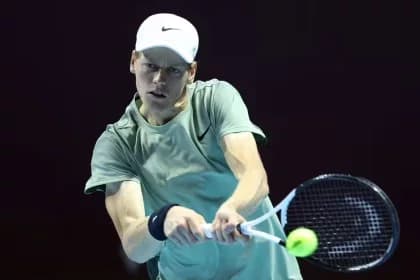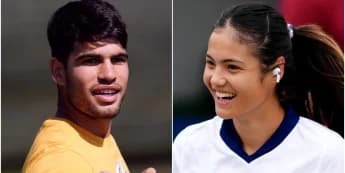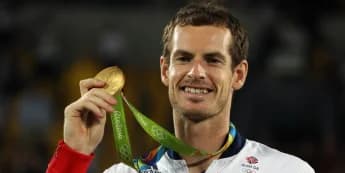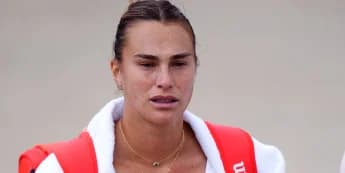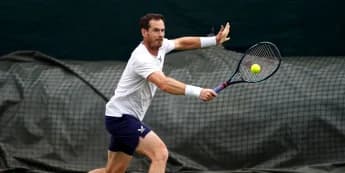As the tennis world holds its breath, Goran Ivanisevic advocates for Jannik Sinner amid WADA's appeal for a two-year ban, emphasizing the need for fresh talent and fair treatment in the sport's ongoing doping saga.
The tennis community finds itself embroiled in controversy once more as the World Anti-Doping Agency (WADA) seeks a two-year ban for Jannik Sinner, following the player’s contentious positive tests for clostebol earlier this year. Meanwhile, as WADA challenges the decision that exonerated the world No. 1, a renowned figure from tennis history, Goran Ivanisevic, has stepped forward, bringing his own experience with the agency’s often severe scrutiny.
Sinner, who tested positive for clostebol on two occasions in March, successfully contended that his positive results stemmed from contamination, which resulted in a ruling that he was not at fault or negligent. Nevertheless, WADA is not satisfied with this outcome and is appealing the ruling in search of a more severe punishment. Ivanisevic, familiar with the intense scrutiny from WADA, expressed his emotional support for the Italian player.
Having assisted Marin Cilic during the Croatian player's doping case in 2013, Ivanisevic is well aware of the unyielding nature of WADA’s investigations. Cilic, who incurred a positive test for nikethamide after ingesting contaminated glucose tablets, had his initial nine-month suspension cut down to just four months after appealing the decision. It was a challenging and lengthy journey, but both Ivanisevic and Cilic emerged victorious, with Cilic ultimately going on to win the US Open title in 2014.
Ivanisevic's observations regarding WADA's methods hold significant importance, stemming not just from his involvement in Cilic's case but also from his comprehensive understanding of the immense pressure athletes endure in the sport. "I have had to confront WADA and individuals I found unlikable, people who aim to ruin someone’s life," Ivanisevic expressed, reflecting the concerns of players who believe that anti-doping agencies are overly hasty in branding them as guilty.
“I truly hope for a favorable outcome for Sinner,” he stated, emphasizing his conviction that the Italian should not receive a suspension. Ivanisevic’s point is unmistakable: the sport requires players like Sinner. The next generation of tennis is in dire need of rising stars, and Sinner, with his composure on the court and his increasing capability to challenge the sport’s established top players, is an essential part of that future.
Indeed, Ivanisevic’s appeal serves as a reminder of the wider consequences of a doping case, particularly one that involves an emerging talent like Sinner. The repercussions are not limited to the individual player; they impact the entire sport. For Sinner, a competitor who symbolizes the future of men’s tennis, the uncertainty surrounding his situation casts a pall over what should be a thrilling phase in his career.
The timing of the appeal holds significant importance, as Sinner has been a central figure in discussions about the emerging rivalry among the next generation of tennis players. Together with Carlos Alcaraz, Sinner is regarded as the natural successor to the legacy established by icons like Novak Djokovic, Rafael Nadal, and Roger Federer. For Ivanisevic, who once coached Djokovic, the message is unmistakable: “Tennis needs Sinner. We cannot afford to lose him to a protracted and unnecessary ordeal.”
As the Court of Arbitration for Sport (CAS) gets ready to review WADA’s appeal, Sinner’s team finds themselves in a state of anxious anticipation. The player has voiced his frustration multiple times but stays committed to his performance on the court. With his temporary suspension removed and the ban overturned, Sinner is able to compete while the appeal proceeds.
Although Ivanisevic remains cautiously hopeful, the potential for a lengthy suspension introduces additional complications to an already challenging season. In a sport where maintaining consistency and achieving peak performance are vital, distractions of this nature can significantly impact a player's concentration and rhythm. Nevertheless, Sinner has demonstrated remarkable maturity in managing off-court issues, and many are optimistic that he will continue to navigate this turbulent situation with the same calmness he exhibits during matches.
The tennis world is now attentively observing as WADA's appeal progresses, longing for a just conclusion to what is rapidly turning into one of the most significant doping cases in the sport's recent history. For Ivanisevic, this struggle is deeply personal, and the result, which he hopes will benefit Sinner, has the potential to transform the future of anti-doping regulations in tennis.
Meanwhile, attention should be directed toward Sinner’s remarkable skills. His career, similar to that of Cilic, should be characterized by his on-court accomplishments rather than being overshadowed by a doping controversy that raises doubts. Tennis, as Ivanisevic aptly emphasizes, requires players like Jannik Sinner—individuals who represent the future of the sport and provide optimism for the upcoming generation.
As WADA's appeal progresses, the tennis community watches anxiously. With figures like Ivanisevic backing Sinner, there is hope that justice will prevail—and that the Italian talent can carry on his rise in a sport that is in dire need of new personalities like him.
The tennis community finds itself embroiled in controversy once more as the World Anti-Doping Agency (WADA) seeks a two-year ban for Jannik Sinner, following the player’s contentious positive tests for clostebol earlier this year. Meanwhile, as WADA challenges the decision that exonerated the world No. 1, a renowned figure from tennis history, Goran Ivanisevic, has stepped forward, bringing his own experience with the agency’s often severe scrutiny.
Sinner, who tested positive for clostebol on two occasions in March, successfully contended that his positive results stemmed from contamination, which resulted in a ruling that he was not at fault or negligent. Nevertheless, WADA is not satisfied with this outcome and is appealing the ruling in search of a more severe punishment. Ivanisevic, familiar with the intense scrutiny from WADA, expressed his emotional support for the Italian player.
Having assisted Marin Cilic during the Croatian player's doping case in 2013, Ivanisevic is well aware of the unyielding nature of WADA’s investigations. Cilic, who incurred a positive test for nikethamide after ingesting contaminated glucose tablets, had his initial nine-month suspension cut down to just four months after appealing the decision. It was a challenging and lengthy journey, but both Ivanisevic and Cilic emerged victorious, with Cilic ultimately going on to win the US Open title in 2014.
Ivanisevic's observations regarding WADA's methods hold significant importance, stemming not just from his involvement in Cilic's case but also from his comprehensive understanding of the immense pressure athletes endure in the sport. "I have had to confront WADA and individuals I found unlikable, people who aim to ruin someone’s life," Ivanisevic expressed, reflecting the concerns of players who believe that anti-doping agencies are overly hasty in branding them as guilty.
“I truly hope for a favorable outcome for Sinner,” he stated, emphasizing his conviction that the Italian should not receive a suspension. Ivanisevic’s point is unmistakable: the sport requires players like Sinner. The next generation of tennis is in dire need of rising stars, and Sinner, with his composure on the court and his increasing capability to challenge the sport’s established top players, is an essential part of that future.
Indeed, Ivanisevic’s appeal serves as a reminder of the wider consequences of a doping case, particularly one that involves an emerging talent like Sinner. The repercussions are not limited to the individual player; they impact the entire sport. For Sinner, a competitor who symbolizes the future of men’s tennis, the uncertainty surrounding his situation casts a pall over what should be a thrilling phase in his career.
The timing of the appeal holds significant importance, as Sinner has been a central figure in discussions about the emerging rivalry among the next generation of tennis players. Together with Carlos Alcaraz, Sinner is regarded as the natural successor to the legacy established by icons like Novak Djokovic, Rafael Nadal, and Roger Federer. For Ivanisevic, who once coached Djokovic, the message is unmistakable: “Tennis needs Sinner. We cannot afford to lose him to a protracted and unnecessary ordeal.”
As the Court of Arbitration for Sport (CAS) gets ready to review WADA’s appeal, Sinner’s team finds themselves in a state of anxious anticipation. The player has voiced his frustration multiple times but stays committed to his performance on the court. With his temporary suspension removed and the ban overturned, Sinner is able to compete while the appeal proceeds.
Although Ivanisevic remains cautiously hopeful, the potential for a lengthy suspension introduces additional complications to an already challenging season. In a sport where maintaining consistency and achieving peak performance are vital, distractions of this nature can significantly impact a player's concentration and rhythm. Nevertheless, Sinner has demonstrated remarkable maturity in managing off-court issues, and many are optimistic that he will continue to navigate this turbulent situation with the same calmness he exhibits during matches.
The tennis world is now attentively observing as WADA's appeal progresses, longing for a just conclusion to what is rapidly turning into one of the most significant doping cases in the sport's recent history. For Ivanisevic, this struggle is deeply personal, and the result, which he hopes will benefit Sinner, has the potential to transform the future of anti-doping regulations in tennis.
Meanwhile, attention should be directed toward Sinner’s remarkable skills. His career, similar to that of Cilic, should be characterized by his on-court accomplishments rather than being overshadowed by a doping controversy that raises doubts. Tennis, as Ivanisevic aptly emphasizes, requires players like Jannik Sinner—individuals who represent the future of the sport and provide optimism for the upcoming generation.
As WADA's appeal progresses, the tennis community watches anxiously. With figures like Ivanisevic backing Sinner, there is hope that justice will prevail—and that the Italian talent can carry on his rise in a sport that is in dire need of new personalities like him.

